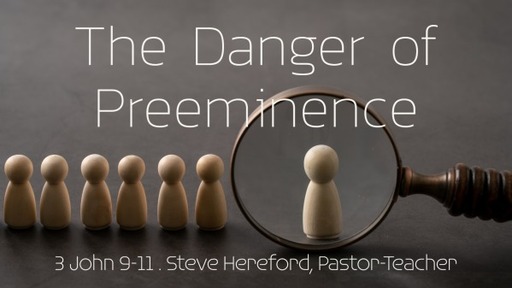The Danger of Preeminence

If you desire to be first, what does that say about you? How can the lack of hospitality reveal your true spiritual condition? Join Pastor Steve as he examines 3 John 9-11 and the life of Diotrephes.
Gaius was graciously hospitable, Diotrephes ungraciously inhospitable. Gaius loved the truth and loved everyone humbly (vv. 3–6); Diotrephes refused the truth and loved himself, and threatened everyone from his position of self-appointed authority in the church. One submitted to the words of truth; the other spouted words of contempt. The difference between the two men was not primarily doctrinal but behavioral; John did not rebuke Diotrephes for heresy, but for haughtiness.
Diotrephes is a man who puts on airs. He is pretentious. He is vainglorious. He struts around as a peacock. He has an overweening ambition. He is puffed up, inflated like a balloon. He is one whom you have to receive with a flourish of trumpets. He comes in in a blaze of glory
“self-seeking” refers to what the selfish are after and “vainglory” to what they get when they succeed, a lot of glory that is entirely κενός, “empty,” hollow. Yes, this “self-seeking” is minding a certain thing, and the thing is “empty glory” when it is achieved.
As James earlier showed that the tongue is capable of creating disastrous evil, so here he emphasizes the destructive power of envy and selfish ambition. From them flow all kinds of evil, including vandalism, murder, adultery, warfare, theft, slander, and other sins that violate people and provoke chaos in the community.
John would not overlook this challenge to his apostolic authority and to Christ’s rule in the church. He would expose Diotrephes before the congregation, make his conduct a matter of church discipline (1 Tim. 5:19–20), and, if need be, use his apostolic authority to deal with him.
Diotrephes’ malicious accusations were evil, false, and slanderous. He saw John as a threat to his power and prestige in the church and savagely attacked him.
Not only are Diotrephes’ words vicious; his deeds are equally reprehensible. He willfully breaks the rules of Christian hospitality by refusing to receive missionaries sent out to proclaim the gospel. By denying them shelter and food, he hinders the progress of the Word of God. In brief, Diotrephes is thwarting God’s plans and purposes and consequently he faces divine wrath. (Simon J. Kistemaker, III John, New Testament Commentary [Grand Rapids: Baker, 1986], 9–10)
So threatening was Diotrephes that he had the clout to excommunicate anyone he perceived as an apparent threat. Perhaps that had actually happened to Gaius, which could explain why John had to tell him about what was going on in the church. If he was still in the church, Gaius was facing hostility and opposition from Diotrephes, prompting John to encourage him not to give in, but to continue to show hospitality in the future
Like most conflicts in the church, this one stemmed from pride. It was pride that caused Diotrephes to slander John, snub the missionaries, and eliminate those who defied him. His arrogance led to ambition, which resulted in false, slanderous accusations, defiance toward apostolic authority, and the crushing of any opposition to his power. Sadly, there have always been people like Diotrephes in churches. Even more tragically, many churches, either because they are fearful of them, or in the name of tolerance, refuse to deal with their own Diotrephes types. The apostle John, however, had no hesitation in confronting such a sinner for the good of the church and the honor of Christ.
Tyranny like that of Diotrephes reflects the opposite of the love of God; the temptation to respond in kind must be resisted.
He who is unfeeling, unmerciful, unkind, hath not seen God—has no proper knowledge of that God whose NAME is mercy, and whose NATURE is love.
